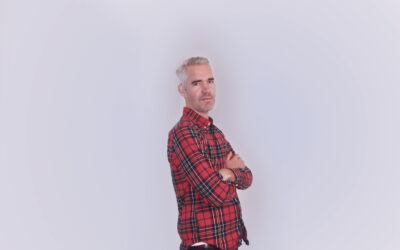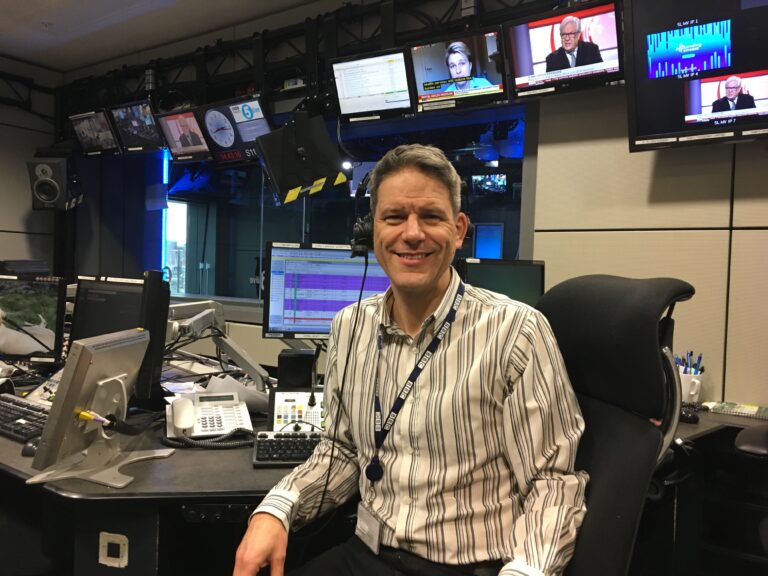This week it’s Tim Levell, Editor of The Emma Barnett Show and Chiles on Friday on BBC Radio 5 live. To suggest another senior media or creative figure for A Week In My Life, please email [email protected].
Sunday
Tragically, my working week half-starts on Sunday lunchtime. There’s a producer on our team working in MediaCity looking ahead to Monday’s programme, and I swap calls and texts with her through the day. The story we decide to chase is Meghan Markle giving a speech at her wedding, and our producer bids Emma Watson, Cherie Blair and Malala Youfsazi on the merits of women giving speeches.
There’s also a problem with an item set up for Monday. I call a member of the BBC’s editorial standards team to seek his advice, and send an email to the external PR person involved, reassuring him that all should be well. It means I anxiously check my emails every half hour for the rest of the day to see if he responds. He never does. But it takes the edge off the afternoon.
Perhaps as if to escape, my wife and I mull taking our boys for an impromptu treat at the all-you-can-eat restaurant Cosmo on Deansgate (the new replacement to their all-time fave Red Hot World Buffet, which we’ve not yet visited). We decide to stay in and save our pennies. Instead, we spend a happy hour being all nuclear family and arguing over Absolute Balderdash.
Monday
I forget that I’m writing this column and drive to work instead of cycling. I’m in by 6.30am most mornings, which sounds early, but it’s positively lazy by comparison with the output editor, who’s always in position by 5.30am.
At 7am we have our editorial conference for that day’s programme. There are a team of four experienced and creative producers who work every morning on the programme in Salford, plus our energetic and talented presenter, Emma Barnett, who joins on the phone from London. She’s normally with us in person, but she’s just three weeks from going on maternity leave, so we’ll cut her some slack.
This morning we have a fair amount fixed already. Emma did a pre-recorded interview with Frank Lampard on Friday, and that’s leading the show. He’s given us some decent “news lines”, including the impact of social media on his daughters, and the fact that he doesn’t like young players flashing their money.
Our tireless press and comms team take the key quotes and write them up, getting them out speedily to the papers. In a crowded news market, getting credit for 5 live’s stories outside the BBC is something we care a lot about and we are constantly in touch with our brilliant comms team to maximise the reach of our stories.
The rest of the show works well – although we never did get Emma Watson, Cherie Blair or Malala Youfsazi to come on and talk about women giving speeches. If persistence is a key to success, dealing positively with rejection comes a close second.
Once we’re off air at 1pm we have our weekly meeting of all the 5 live programme editors. By the time we’re out, Frank Lampard’s story has already been picked up by the Mail and Sun websites. Back of the net.
After the show I drive from Salford to our home in south Manchester – and then turn around again straightaway, this time with my youngest son in the car, taking him to his violin lesson in Stretford. Two hours in the car. It’s like living in London.
By 9pm it’s the last job of the day, when I head out to the local church youth club to pick up my oldest son. Except when I arrive, he’s not there. Another parent has already “helpfully” collected him.
Tuesday
I creep out of the house at 5.50am, hoping I don’t wake the house as I drag my suitcase behind me. I’m off to London for a night, and for some reason, packing the night before means I always forget one of my pyjamas, charging cable or toothbrush.
As usual, 6.30am to 1pm is focussed on making and shaping today’s show. For me, the standout moment happens in the final hour, when, following a discussion of maternity discrimination, a pregnant woman called Claire calls in to say that she’s being edged out of her job because she’s having a baby. She fears that, at 28, her career is over. Emma, with her customary grit and ebullience, tells her to stick at it. Getting listeners like Claire to ring in and tell their stories honestly is what marks out 5 live’s output.
After the show we have a team meeting – to discuss upcoming plans, and, in other exciting embrace-the-future news, to discuss the introduction of Slack. The work-focussed messaging app has been all the rage in LA, and now, MCUK. It should, so the theory goes, cut down on email traffic and encourage conversation. Everyone signs up, and I breathlessly download the app myself. For about three whole minutes, I stare at the screen, knowing it’s time to lead from the front, but not quite sure what to say. Eventually I pluck up the courage. “Hello”, I type.
Several hours later, it is all deathly quiet. At last one obliging colleague plucks up the courage. “Hello Tim”. This will definitely transform our working environment.
By 7pm I’m in East London, at a networking event looking at the future of media in 2018. I’m involved with an organisation called TheMediaNet, which links Christians working in the media around the UK. One of the guests, when asked about the most significant technological change of the year, talks about the rise of smart speakers.
It’s good timing. 5 live newsreaders have just started providing the news bulletins for Siri. It’s a way of getting our 24-hour news service out to more (and presumably younger) listeners.
Wednesday
By 6am I’m in the BBC’s Millbank studios for our main politics show of the week, wrapping around our live coverage of PMQs. Wednesday is always one of the most frenetic days because the team have arranged for a non-stop stream of politicians to come through, and every interview needs careful preparation.
Harriet Harman is with us live at 10am, and Emma, the studio editor and I spend over half an hour trying out questions and working out what our audience will most want to know. Should we ask about gender pay? Is the audience still interested? What might she say that’s new?
In the end, Harriet Harman surprises us by saying that Theresa May is “a woman, but not a sister, and I regret that”. It’s a memorable quote. Our snappy social media producer gets it out on Twitter and the press office, again, obligingly help spread the word.
Before I leave to get the train back to Manchester, I enter one of our previous programmes for an award. Getting all the elements ready for an award entry is a lot of work, but they’re vital for industry recognition. The entry deadline is 5pm. I get it in by 4.50pm: 10 minutes to spare. That’s one of the reasons why I love news. Tight deadlines focus the mind.
A notification I’ve not seen before buzzes on my phone. Seven new messages – on Slack. It’s taking off: the team starting to use it to share ideas for Thursday’s and Friday’s shows.
Thursday
It’s one of those days. Normally, for a three-hour show, about half the items are set up ahead of time by our planning producers, with the rest decided and booked in the morning. It’s about the right balance: enough in place to ensure we have well-produced, journalistically-strong items; but enough flexibility to react to the overnight news.
But this morning we have too much flexibility. The whole first hour is blank.
Fortunately the team has plenty of ideas and Emma fizzes with possiblities.
We decide on a story about a Bristol tanning shop installing sprinklers to deter rough sleepers at 10, and the rise of middle-aged drinking at 10.30. One producer takes each item. They start researching and calling potential guests at 7.30.
But for some reason, nothing is working. By 9.45 – just 15 minutes to go – the whole first hour has not a single guest. Working in live radio you have to have nerves of steel, but even I’m beginning to think this is cutting it fine. This tight deadline is definitely focussing my mind.
Then one of our endlessly resilient and creative producers “fixes” a guest, and the show starts to fall into place. We have our lead story – and the other items shape up nicely too.
But the standout story is a pre-planned one: about men who live as puppies. It could backfire and be sleazy and tacky; but in the end, thanks to careful pre-production and careful interviewing by Emma, it’s fascinating, considered and even charming. In the show debrief, we are full of praise for the producer who spotted this growing trend and suggested it for the programme. It’s wonderful to have a team who constantly suggest surprising and unexpected ideas like this. It’s also wonderful when a clip of the item is selected by Radio 4’s Pick Of The Week for that Sunday’s programme.
Friday
A change of presenter. Fridays are all about Adrian Chiles and his new show, Chiles on Friday. It’s a look back at the week and ahead to the weekend, and is already building up a loyal following – including Radio 1’s Greg James, who surprises us by tweeting, just before we’re on air, “Thursday’s child has far to go/ Friday’s Chiles is full of news, sport and entertainment.”
It’s also full of Alex Winters, co-star alongside Keanu Reeves of Bill and Ted’s Excellent Adventure. One of our producers has been in touch with him for a couple of months, discussing the possibility of him talking to us, and he’s now given our programme his first broadcast interview talking about being abused as a child actor. It’s a thought-proving and powerful half-hour.
Adrian interviewed him the previous evening and the producer arranged for it be filmed too (Alex was in a radio studio in LA). Radio is also about pictures too nowadays. The footage is sent first thing to our comms team who send it out to the papers, along with his key quotes. They’ve helped us every day this week with getting impact for our stories. By 11am it’s the most-watched video on the BBC News website.
Just before I leave work, at 5.34pm, I post this on Slack. “Have a good weekend everyone! Thank you for a top week. Frank Lampard, Alex Winter and puppies. Yet another week of highlights!”
Granted, our working day starts at 6am, so by mid-afternoon, most people have gone home.
But still, the reaction I get is overwhelming.
Silence.











